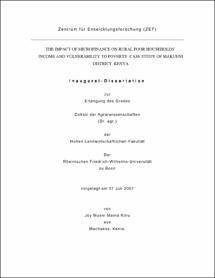The impact of microfinance on rural poor household's income and vulnerability to povertycase study of Makueni district, Kenya

The impact of microfinance on rural poor household's income and vulnerability to poverty
case study of Makueni district, Kenya

| dc.contributor.advisor | Frohberg, Klaus | |
| dc.contributor.author | Kiiru, Joy Mueni Maina | |
| dc.date.accessioned | 2020-04-09T08:21:01Z | |
| dc.date.available | 2020-04-09T08:21:01Z | |
| dc.date.issued | 2007 | |
| dc.identifier.uri | https://hdl.handle.net/20.500.11811/2730 | |
| dc.description.abstract | Microfinance has become very important in global poverty reduction debates. The popular assumption is that enabling poor households access to credit helps households begin micro entrepreneurship which would enable them improve their incomes and eventually escape poverty. Evidence from research so far has been scanty, and many results have been highly contested. The main objective of the thesis was to analyze the impact of microfinance on household income as well as measure household vulnerability to poverty after access to microfinance. The study is an experimental case of Makueni district where participants in microfinance programmes and non participant households were studied over time; thus yielding a rich pooled data for analysis. On integrating time dynamics in the analysis, the results indicate a positive and significant impact of microfinance on household income. To this end the thesis argues that there is a role of microfinance on the improvement of household incomes. The thesis also re asserts that providing affordable financial services to the rural population still remains to be an important component of development strategy. On the other hand the thesis emphasizes that there is need to come up with innovative microfinance institutions that are supportive of their own role in assets accumulation and wealth creation for their clients. This will involve innovative targeting of potential clients, as well as streamlined microfinance regulations to protect their clients. In particular the study cautions that the ability of households to begin informal sole micro entrepreneurships should not be assumed to be adequate for the improvement of household income. There is need to create a policy framework to spur growth not only in the micro enterprises but also in the overall rural economy that would lead to the creation of employment opportunities and an increment in the agricultural output. This is quite a big task to accomplish and may require more than one particular policy intervention. In essence this calls for both private (microfinance) and public partnerships to create the environment where such poverty reduction objectives could be realized. | en |
| dc.language.iso | eng | |
| dc.rights | In Copyright | |
| dc.rights.uri | http://rightsstatements.org/vocab/InC/1.0/ | |
| dc.subject | Microfinance | |
| dc.subject | joint liability lending | |
| dc.subject | poverty reduction | |
| dc.subject.ddc | 300 Sozialwissenschaften, Soziologie, Anthropologie | |
| dc.title | The impact of microfinance on rural poor household's income and vulnerability to poverty | |
| dc.title.alternative | case study of Makueni district, Kenya | |
| dc.type | Dissertation oder Habilitation | |
| dc.publisher.name | Universitäts- und Landesbibliothek Bonn | |
| dc.publisher.location | Bonn | |
| dc.rights.accessRights | openAccess | |
| dc.identifier.urn | https://nbn-resolving.org/urn:nbn:de:hbz:5N-11816 | |
| ulbbn.pubtype | Erstveröffentlichung | |
| ulbbnediss.affiliation.name | Rheinische Friedrich-Wilhelms-Universität Bonn | |
| ulbbnediss.affiliation.location | Bonn | |
| ulbbnediss.thesis.level | Dissertation | |
| ulbbnediss.dissID | 1181 | |
| ulbbnediss.date.accepted | 24.09.2007 | |
| ulbbnediss.fakultaet | Landwirtschaftliche Fakultät | |
| dc.contributor.coReferee | Holm-Müller, Karin |
Files in this item
This item appears in the following Collection(s)
-
E-Dissertationen (1107)




